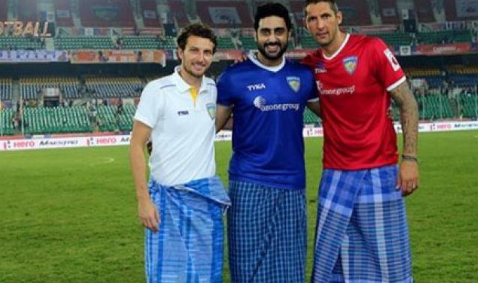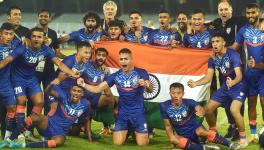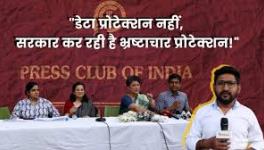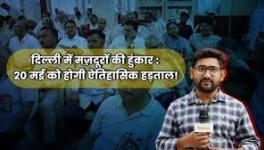Musical Chairs and Football: The Trend of Changing Ownership in the ISL

Among the original Indian Super League (ISL) franchises -- from its opening season in 2014 -- only Chennaiyin FC, co-owned by Abhishek Bachchan (in pic), has the original set of owners.
Chennaiyin FC are one of the more successful teams in the Indian Super League (ISL). In the six seasons, they have made the final thrice and twice emerged champions.
Chennaiyin hold another unique distinction, off the pitch. Of the eight teams, who began journey in 2014 with a promise to change the face of Indian football, the Chennai franchise are the only one, whose ownership has remained with the same set of people.
For the rest, the story has followed a telling and similar narrative. In some franchises, the management has either changed hands completely, or partly. And on more than one occasion too. A couple of them have either folded up or have travelled to other cities in search of greener pastures.
Let’s take the example of Kerala Blasters, a team which attracts more crowds at their home base in Kochi than any other teams. Owned by a company, Blasters Sports Ventures Private Limited, it had Prasad V Potluri and Sachin Tendulkar as co-owners in 2014.
Tendulkar, when he got involved, had expressed his desire to restore the glory of Kerala football. However, he sold his stakes and walked away in 2018 citing “personal reasons”. The cricket icon didn’t elaborate further.
Also Read | Scotland, North Macedonia and Hungary Seal Euro Spots
In between, a couple of film stars from the southern part of the country, a film producer and an industrialist joined the show. Overall, in six years, the role of the Secunderabad registered company has remained the same, but the co-owners have changed more than once.
But to be fair, it hasn’t dented the club’s football activities, at least not on paper. Decent foreign and Indian recruits have helped the club gain popularity. At the same time, the club’s policy of frequent sacking of coaches (nine managers in six seasons) has left many wondering about what may have been if the franchise was backed by a management with their focus and priorities set the right way.
Take the Guwahati based outfit, NorthEast United FC. It’s the only ISL franchise not owned by a company and belongs to film actor John Abraham and a Kerala based businessman named Jayabalan. In 2014 when the franchise rights were awarded, Abraham had Shillong Lajong FC as his partner, but Lajong owner Larsing Ming sold his stakes within a year.
As per sources, NorthEast United have been facing financial trouble for some time now. Footballers and coaches, who joined and left the club confirmed the club resorted to austerity measures to cut spending and stay afloat.
The story of the journey of ownership is more or less similar in all other franchises. The lone ISL club in the northern part of the country has not just changed ownership, but the name of the club and city too. Delhi Dynamos were first owned by Den Networks in 2014. They lost interest in two years and sold it to GMS, a company involved in the business of buying ships and offshore assets for recycling.
The new owners shifted the club to Bhubaneswar with a changed name, Odisha FC and are yet to manage any notable success. Dutch club Feyenoord entered into an alliance with the franchise, but that did not last beyond a season.
A similar story unfolded in the western part of the country. FC Pune City was launched with lots of fanfare in 2014. Initially, Salman Khan was supposed to come on board with the Wadhawan Group. But he didn’t. Instead, actor Hrithik Roshan joined hands with Italian Serie A side Fiorentina, but the arrangement didn’t last long.
In the end, the Pune franchise proved to be a misadventure and closed down in 2019. If certain problems in Wadhawan group’s business was the reason, then football, too, was not really making a headway in the historic Maharashtra town. After buying the rights to the franchise, the new owners moved it to Hyderabad and launched Hyderabad FC.
Also Read | Big Football Leagues Will Begin in India, But For the Rest There Remains Nothing
“These are issues which shouldn’t be equated with the progress report of the actual game,” pointed out a franchise official. “The change of ownership doesn’t necessarily always mean the closure of the club or its failure to make an impact as a football team.
“In a business model, ownerships do change constantly. Either for capital gain or for the business profitability model. It happens in business. People often sell their business and move on to the next venture. Here, it also may indicate more and more people are interested in football,” he added.
Others point at the A-League (Australia) and MLS (US), since the ISL model is based largely on these two leagues. There too clubs often change hands without hampering the game on the pitch. It is always a teething problem, till things settle down, or so comes the justification.
True. In the MLS, ownerships do change hands, but certainly not with the frequency in India. On average, the owner or the owners of a club stay on for at least five seasons before a fresh set of people come in to run the show. In certain cases, the owners have washed their hands off rather fast, like in Seattle Sounders FC or in San Jose Earthquakes, but that could easily be passed on as exceptions.
On the contrary, there are teams like LA Galaxy or New England Revolution, whose owners have been sitting pretty for more than 20 years, while in many other clubs, ownership has not changed for nearly 10 years. The ownership changing pattern is not exactly different in the A League, either.
“The equation is simple,” says an official closely associated with Indian football for 25 years now. “Firstly, some of the owners could be genuinely interested in football and have come with a real purpose in mind. But there are some, who could be reluctant participants for reasons I don’t want to get into.
Also Read | ATK Mohun Bagan Fan Uprising: A Battle Won Online, the Plot Lost at the Maidan
“Secondly, the business model is yet to find its feet. The franchises do receive money from the central pool, but that can only cover up for their annual participation fee. Unless money comes in from television coverage, I am not sure what the balance sheet of the franchises would reflect after, say, five years. I don’t feel surprised when a certain owner quits,” said the official.
There are others who see good in constantly changing ownerships. One development cited as a positive is the entry of the famous City Football Group as part owners of Mumbai City FC. It could be the game changer. Finally, an international company has taken note of Indian football and has agreed to invest in the game. More could follow in the coming years. Ifs and buts remain.
With the entry of ATK-Mohun Bagan and East Bengal could be a huge boost, and more potential investors could line up to share the financial burden of the franchises. But we all know the struggle at least one of the Kolkata giants -- if not both -- faced while getting the finances up to scratch to meet the demands of the ISL.
Their entry exudes some optimism and has generated a buzz too. At the same time, though, there is a fear factor attached to it too. Given the trend as seen in the ISL, where is the guarantee that even the current investors, who have come in with pomp and gaiety would not back out sooner than expected?
The success of football in India, or for that matter in any country, largely depends on the performance of the national team. Club football can hardly sustain interest unless there is some amount of hope surrounding the national team. Spectators mostly turn their face away when the national team fails to impress.
The scenario is far from satisfactory in India at the moment. Once the euphoria of holding Asian champions Qatar to a draw was over, they struggled to avoid defeats against Bangladesh and Afghanistan in the past year.
At present, all energies of the Indian football establishment are being focussed on showcasing club football. A particular form of it, to be precise. Ignoring the rest could lead to a larger slide in fortunes, and more and more owners could start getting jittery, lose interest. The next step for them… Well, we have that step happening, almost on a repeat loop, throughout ISL’s nascent life.
Get the latest reports & analysis with people's perspective on Protests, movements & deep analytical videos, discussions of the current affairs in your Telegram app. Subscribe to NewsClick's Telegram channel & get Real-Time updates on stories, as they get published on our website.
























